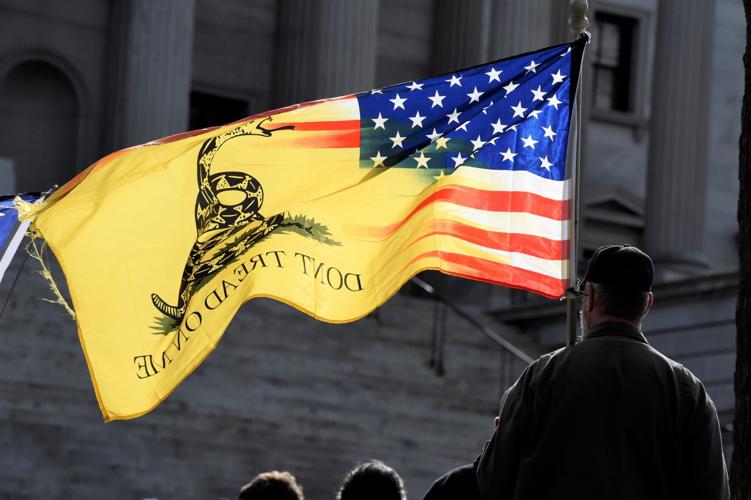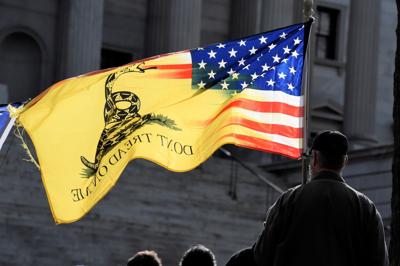I’m sitting in Five Points as a huge yellow ‘Don’t Tread On Me’ flag whips through the intersection, hanging onto a huge white truck.
Just a few weeks ago, I’d seen NiA company’s stinging production of the short play "Passover," directed by Lonetta Thompson in USC’s black box space.
The play takes place on a streetcorner that our two main characters have made something of a home out of. But as the play meanders on, in a modern reflection of theater classic ‘Waiting for Godot,’ the setting wavers between literal and supernatural — it is a streetcorner, it is an illustration of stuck-ness, it is a representation of any place where oppressed people are kept.
Kitch and Moses share a life here, are something like family to each other, scavenging food and humor; but they speak often to each other of ‘passing over,’ passing beyond this, passing on.
As the play graduates from mundane to metaphysical, as does the meaning of the phrase ‘pass over’ — at first the two simply hope to get off the streets, to achieve some modicum of physical comfort and home. As their conversations grow the phrase bloats — to ‘pass over’ is to have a room with a door to close, to pass over is to not have to tailor the way you speak to White people in order to remain safe and not be seen as an animal. To pass over is to not live in fear, to pass over is to go out to barbeque and be able to afford it, to pass over is to call back to the book of Exodus and be freed from the oppressor in victorious droves, to be redeemed.
Though not overtly stated, Moses and Kitch volley this phrase at one another and heighten its urgency, shift its definition under each other’s feet. The calculations seem to always round out the same, that to truly pass over, pass through and fully out of a rigged and harangued existence as a Black man, is to die.

Cassidy Spencer is a writer and columnist for Free Times. Photo by Alyssa Thorn/Special to the Post & Courier
In research of the Don’t Tread On Me flag, I come again upon the amazing paradox of White conceit. The flag was developed by Colonel Christopher Gadsden as a unifying symbol of the 13 colonies — the revolutionary colonists that threw Great Britain off and fought for sovereignty on American soil. In the scrabble to be sovereign, to be freed, the colonial population grew, displacing droves of Native Americans. Of that growing colonial population were the colonist’s slaves, as slavery was still legal in all the colonies.
The amazing symbol of this flag is still salient; the wild dedication to douse anything that threatens to tread on one, while remaining dedicatedly blithe to those, othered, that happen to fall underfoot. In the current racial landscape, the flag all but screams paranoia-as-gospel: ‘I’m not being tread upon now but I’m looking to handicap anyone who looks like they might ever try it.’ This is how the White characters in the play behave.
Moses and Kitch interact with two White men: the lost and oblivious Mister, and the classically cop, authoritarian and stiff Ossifer. Ossifer polices their corner, seemingly just for something to do, somebody to feel bigger than, to reinforce hierarchy; flashing his power against the sun and into their eyes.
Mister wanders accidentally into their block, and exhibits all the classic false White niceties: trying not to seem uneasy, attempting generosity while failing to hide his close-held savior complex, poking jokingly at why these men say the n-word so often and why shouldn’t he himself be able to say it, too? If we’re all friends?
This is the first moment we see Mister outright angry.
Moses tells him, “You can’t say that word because it’s not yours.”
Mister erupts, “Everything is mine.”
In a moment Moses and Kitch feel genuinely powerful, magical, about to go get some food — Mister returns. He notes the shift in their disposition, not subservient, not small. Going somewhere. He senses the possibility of something rearing up, maybe even treading on him someday. He shoots Moses.
In the last moment of the play, Mister delivers a skin-crawling speech that we’ve heard something like before; a stitching-together of vague, self-excusing apologisms:
“It’s really such a tragedy — this was an unforeseen event — there was nothing that could have been done — we just couldn't have acted quickly enough — though it really is unfortunate — we hate to see tragedies like this occur.”
Referencing shame, leaving responsibility unclaimed and never reaching the meat of change.
Keep a keen eye on NiA company as it continues to produce much-needed, articulate theater in Columbia, SC.











